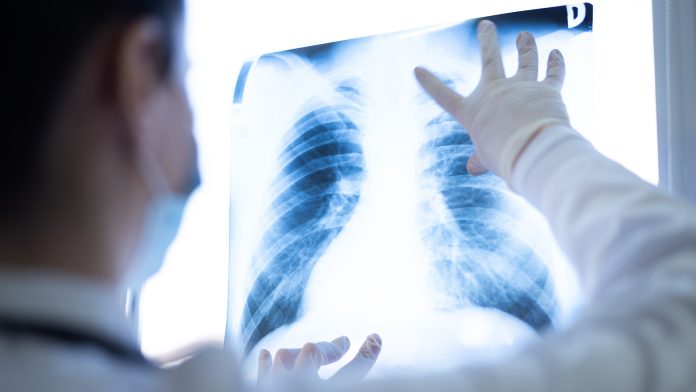
A new study demonstrates the benefits of lung cancer screening across socioeconomic groups and the importance of screening for people experiencing economic deprivation.
Lung cancer is one of the most common and serious types of cancer, affecting the lives of over 43,000 people a year in the UK. Screening aims to find lung cancer early when there are more treatment options.
Previous research has illustrated the benefit of lung cancer screening in identified high-risk groups. Now, University of Liverpool and Queen Mary University of London research teams have published the first study in the UK that demonstrates the benefits of lung cancer screening across socioeconomic groups, especially the value of early screening in social deprivation groups.
The research is in the a newly published Lancet Regional Health Europe paper and addresses how lung cancer outcomes are comparable across all socioeconomic groups.
Health disparities across socioeconomic groups
Lower economic status is associated with numerous health challenges, including lung cancer. In England, there is a strong link between deprivation and cancer cases attributable to smoking, reflecting the longstanding socioeconomic inequality in smoking prevalence.
However, the link between health inequalities and deprivation is not limited to lung cancer, other research provides valuable insight into how social deprivation leads to health disparities. Mind, a mental health charity, conducted research into people who have lived or are living in poverty and how that impacted their experience with mental health support. The findings showed how many people facing poverty worried they were underserving of support as they felt “mental health is a white, middle-class conversation they can’t tap into”.
More recently, research published by the BMJ proposed solutions to the ever-worsening state of healthcare and the socioeconomic status. Life expectancy and healthy life expectancy are closely linked to deprivation: the greater the deprivation, the shorter the life expectancy. Those living in deprived areas spend more of their shorter lives in poor health
The impact of lung cancer screening across the socioeconomic spectrum
The researchers examined the long-term outcomes of recruited participants from across the socioeconomic spectrum. They assessed the impact of socioeconomic status on a variety of aspects, including initial recruitment, selection for screening, lung cancer detection, and long-dose mortality benefit from lung cancer and other diseases.
The findings showed that those from a lower socioeconomic background benefited from low-dose-CT screening in terms of lung cancer survival to the same extent to those from more affluent areas.
Significantly, the research illustrated how screening may provide additional health benefits for other smoking-related diseases. The analysis showed that conditions COPD and emphysema, both of which disproportionately affect lower socioeconomic groups, were less often the cause of death when lung cancer screening was offered.
Professor John Field, Professor of Molecular Oncology, University of Liverpool and lead author on the paper said: “The impact of low-dose CT lung cancer screening has been previously demonstrated in a number of international clinical trials, including the UKLS study here in the UK. However, this is the first time that the long-term impact of risk-stratified lung cancer screening has been compared across different socioeconomic groups, demonstrating that those disadvantaged groups at the greatest risk of developing the disease benefit as much as those in less deprived areas.”
Professor Stephen Duffy said: “These results indicate the potential for lung cancer screening to address some serious inequalities in health. As the targeted programme is rolled out nationally, we need to make an effort to deliver the service to those deprived populations who need it most.”










